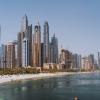
The need to reduce global emissions by shifting away from fossil fuels is evident in the concluding agreements of the 28th Conference of the Parties to the UNFCCC. But what about addressing current atmospheric emissions? Central Asia, with its diverse nations and ecosystems, offers a distinctive platform for mitigating existing emissions through carbon farming practices and nature-based solutions.
The intensive agricultural practices and conversion of grasslands into croplands dilapidated soil fertility and carbon levels for a region now come to be known as the Asian Dryland Belt (ADB) spanning across the greater Central Asia region Now, as the world seeks consensus on curbing emissions, rapid solutions are needed to overcome the existing levels of atmospheric carbon. Global demand for carbon removal poses a new opportunity for ADB countries to re-utilize and restore degraded lands through carbon farming and commodify this process through carbon removal credits. This can contribute to the global action for combatting climate change while supporting restoration of ecosystem biodiversity in the ADB lands as well as the resilience of local farming communities against global warming. With its unique geopolitical and geological landscape, Central Asia could pioneer the trading of carbon removal credits through nature-based sequestration at an unprecedented scale.
"Unlocking an Opportunity: Implementing Carbon Farming in Kazakhstan" is a report which delves into the opportunities and challenges for introducing carbon farming in Kazakhstan, the largest economy in Central Asia, and its surrounding regions. This report is a culmination of the collaborative efforts of a core team of researchers from Advancing Systems Analysis (ASA), in conjunction with the United Nations Convention to Combat Desertification (UNCCD), BRICS Competition Policy and Law Centre, TALAP Research Centre, and is endorsed by the Ministry of Ecology and Natural Resources of the Republic of Kazakhstan.
The report was officially presented on 10 December under the auspices of a side event co-organized by International Institute for Applied Systems Analysis (IIASA), BRICS Competition Law and Policy Centre, and Government of the Republic of Kazakhstan at the Central Asia Pavilion as part of the UNFCCC COP 28 held in Dubai, United Arab Emirates. The event invited presentations from key contributors to discuss how carbon farming and trading can provide a marked contribution to Kazakhstan’s socio-economic development while making it more resilient to climate change and supporting the country’s commitment to combat environmental degradation and climate change.
Moderated by Alexey Ivanov, Director of the BRICS Competition Law and Policy Centre, the session commenced with opening remarks from Mansur Oshurbaev, Vice Minister for Ecology and Natural Resources for the Republic of Kazakhstan. Oshurbaev emphasized Kazakhstan's dedication to combating climate change including the signing of their low-carbon development strategy for 2060 earlier this year, and signalled the pivotal role of involving rural communities and welfare considerations in constructing new carbon farming pathways.
Michael Obersteiner, Director of the Environmental Change Institute at the University of Oxford, and Principal Research Scholar in ASA presented the key findings of the report. Importantly, as per Kazakhstan’s own findings, the potential for sequestration in Kazakhstan’s croplands is up to 35 million tons of CO2eq/year (Kazakhstan, Ministry of Ecology Communications to UNFCCC, 2023) with further potential of carbon emissions reductions in the current activities of its agricultural sectors. He also highlighted the potential for Kazakhstan to raise its carbon prices. Kazakhstan currently has one of the world’s lowest carbon prices for carbon trading including allowances and offset credits. Therefore, there is enormous potential for pricing carbon removal credits to gain revenues for reinvestments whilst maintaining competitiveness in international carbon markets.
Soil carbon management and sequestration can also deliver immediate social and economic benefits such as job creation in the implementation of carbon farming and in the long term, deliver positive monetary and non-monetary outcomes. Pradeep Monga, Senior Advisor at ASA, spoke more on the co-benefits of carbon farming in Kazakhstan. His speech cited evidence of scientific research which demonstrates the positive impact of carbon farming in achieving UN Sustainable Development Goals 2 (Zero Hunger), 13 (Climate Action), and 15 (Life of Land). Monga also emphasized the potential of supporting the initial implementation of carbon farming through international financial opportunities including sustainable land bonds and concessional loans. These findings are discussed in detail in the presented report.
Xiaoxia Jia, Program Officer for Technology and Innovation at UNCCD and a contributing author of the report, delivered a (virtual) presentation on the realities of land in Kazakhstan and the key prospects of land restoration through sustainable implementation of carbon farming. In particular, Jia presented how soil sequestration could improve soil fertility by increasing the water holding capacity for degraded soil which is crucial given the critical agricultural water stress and scarcity concerns in Central Asia. Jia also underscored the need for an integrated approach to land use planning to ensure sustainability in food security, water use, and ecosystem services in the long run. The panel session was followed by an insightful Q&A from various virtual and in-person participants moderated by Ivanov.
The report Unlocking an Opportunity: Implementing Carbon Farming in Kazakhstan concludes phase I of project CAMEA which focuses on exploring the feasibilities of nature-based solutions for carbon removal in Central Asia and Eurasia. We thank all our authors and contributing authors for providing their expertise in enriching the content of this joint report. We also extend our gratitude to the UNCCD for their continued partnership with IIASA as part of the MOU between the two organizations, and the Government of the Republic of Kazakhstan for their continued endorsement. In addition, we thank the organizers of the Central Asia Pavilion for provided a unique platform to disseminate our findings.
To watch the panel session at COP 28 UAE, click here.
To find out more about project CAMEA, click here.
To find out more about our past events, click on 2023, or 2022.


